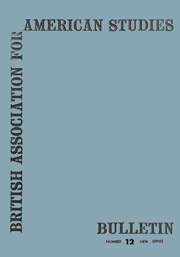No CrossRef data available.
Article contents
Africa and America
Published online by Cambridge University Press: 17 February 2011
Extract
(These notes were offered as a contribution to discussion at the nineteenth and twentieth century sessions of the Third Conference on African History and Archaeology at the London School of Oriental and African Studies, 3 - 7 July, 1961. Two additions - references 3 and 12 - have been made to the original notes.)
The historical position of the United States in Subsaharan Africa has until recently been one of detachment. There have been official moves, as when in 1833 an agreement was concluded with the Sultan of Zanzibar which, among other things, permitted American consuls to reside in his ports and judge disputes involving U. S. citizens; or the recognition of the Congo Free State in 1884. On the whole, however, the United States has left Africa to the European powers who took over the responsibility of governing her peoples.
- Type
- Research Article
- Information
- Copyright
- Copyright © British Association for American Studies 1961




